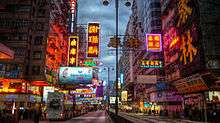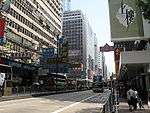Kowloon Masjid and Islamic Centre
Kowloon Masjid and Islamic Centre or Kowloon Mosque is one of five main mosques in Hong Kong.[2] Located in Kowloon, in the Tsim Sha Tsui area at the intersection of Nathan Road and Haiphong Road, besides Kowloon Park, this mosque is currently the largest in Hong Kong. The mosque holds five prayers daily and is capable of accommodating up to 3,500 people.
| Kowloon Mosque and Islamic Centre 九龍清真寺暨伊斯蘭中心 Kowloon Masjid مسجد كاولون والمركز الإسلامي | |
|---|---|
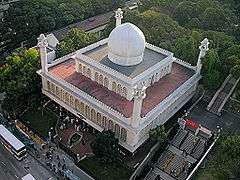 A view of the Kowloon Mosque from above (from the east). | |
| Religion | |
| Affiliation | Sunni Islam |
| Location | |
| Location | 105 Nathan Road, Tsim Sha Tsui, Kowloon, Hong Kong |
| Municipality | Kowloon |
 Shown within Hong Kong | |
| Geographic coordinates | |
| Architecture | |
| Architect(s) | I. M. Kadri |
| Type | Mosque |
| Style | Islamic |
| Completed | 1896 (original building) 11 May 1984 (current building)[1] |
| Construction cost | HK$ 25 million |
| Specifications | |
| Capacity | 3,500 people |
| Dome(s) | 1 |
| Dome height (outer) | 9 meters |
| Dome dia. (outer) | 5 meters |
| Minaret(s) | 4 |
| Minaret height | 11 meters |
| Website | |
| kowloonmosque | |
| Kowloon Masjid and Islamic Centre | |||||||||||||
|---|---|---|---|---|---|---|---|---|---|---|---|---|---|
| Traditional Chinese | 九龍清真寺暨伊斯蘭中心 | ||||||||||||
| Simplified Chinese | 九龙清真寺暨伊斯兰中心 | ||||||||||||
| |||||||||||||
History
The Kowloon Mosque and Islamic Centre was first established in 1896 by the Hong Kong Regiment, on the site where the Tsim Sha Tsui Police Station now stands. It was originally intended to serve the Indian Muslim troops of the British Army stationed at the nearby Whitfield Barracks, now the site of the adjacent Kowloon Park.
In the late 1970s, the building suffered structural issues due to the underground construction carried out for the Mass Transit Railway. With compensation provided by MTR Corporation and donations from the local Muslim community, a new mosque was built and opened on 11 May 1984 on the present site at 105 Nathan Road to replace the old one.
Currently, the mosque primarily serves Muslims from South Asia and Indonesia. Many of them also live in Tsim Sha Tsui, where ethnic minorities have settled. This also explains why it also plays an important role as a cultural site for non-Chinese Muslims in Hong Kong.[3]
Vendors selling South Asian items at Chungking Mansions are close to the Kowloon Mosque (opposite the mosque, across the road).[4]
The building
This mosque, designed by architect I.M. Kadri, represents the unique identity of the Muslim community in Hong Kong. Decorated and elaborate, the traditional Muslim architecture of the mosque contrasts from the modern architecture of the nearby buildings. The most prominent features of the building are the four 11 meters high minarets which mark the corners of the upper terrace and the extensive use of white marble on both the paving and the facade.
In addition to three prayer halls and a community hall, there is a medical clinic and a library. The main prayer hall on the first floor can accommodate 1,000 people. A smaller, women's prayer hall is on the upper floor and is surrounded by a terrace. This upper hall is surmounted by a dome 5 meters in diameter and 9 meters in height.
- The mosque prayer hall.
- Outside view of mosque at night time
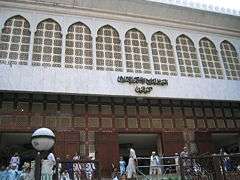 Main mosque entrance, 2005
Main mosque entrance, 2005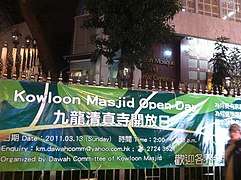 Open Day banner in February 2011
Open Day banner in February 2011
Personnel
The Chief Imam of Hong Kong Mufti Muhammad Arshad (M.A. in Islamic studies) has served as the Imam and Khateeb of this Masjid since 2001. He also teaches the mosque's Arabic language course, and delivers the Friday sermons in Urdu, English and Arabic. He is also responsible for the issuance of fatwa and Quranic Maktabs. In addition, he is an instructor at the Hong Kong Baptist University. He was ranked one of the 500 world's most influential Muslim leaders in 2009.
Maulana Qari Muhammad Tayaib Qasmi is an Islamic scholar who has lived in Hong Kong since 1989. He served as Chief Imam and Khateeb of the Kowloon Mosque till 2001. He has invited many prominent Islamic scholars to Hong Kong from different parts of the world, such as Makki Sahib, Abdul Majeed Nadeem Shah sahib, Imam-e-Kabba, imam Masjid e Nabwi, Maulana Tariq Jameel, Dr. Tahir ul Qadri and Dr. Murtaza Sahib. Dr. Zakir Naik (Trustee) is currently running seven large Islamic Centres throughout Hong Kong, giving free Quranic education to almost 1500 students including adult students, boys and girls, who study full-time in local schools in Hong Kong. The Masjid is very important to the Islamic community of Hong Kong.
Transportation
The mosque is located near exit A1 of Tsim Sha Tsui Station (connected to East Tsim Sha Tsui station by underground walkways). It may be reached via the Tsuen Wan Line or the West Rail Line (if you walk through the station to East Tsim Sha Tsui station).
There is also a bus stop situated outside the mosque, with buses to various destinations in Kowloon, New Territories and Hong Kong International Airport. This stop is either announced as Kowloon Mosque or Kowloon Park (which is adjacent to the mosque).
Water cannon incident
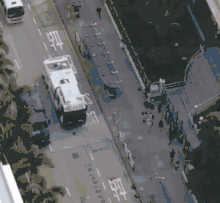
On 20 October 2019 during the anti-ELAB movement, a Hong Kong Police Force water cannon vehicle filled with stinging blue dye sprayed the Islamic Centre twice.[5][6] The dousing caused hit more than 10 people who were around the premises causing various injuries including former Indian Association of Hong Kong chairman Mohan Chugani, a member of the Hong Kong Unison and Jeremy Tam, a member of the Legislative Council and several journalists;[7] all them were hospitalized for further treatment.[8][9][10][11] Masked protesters, pedesterians and mosque-goers rushed to the Islamic Centre to clean up the blue dye left by the police soon after.[12] The police contacted the Mosque authorities explaining the hit as a "mistake"; then they sent some police personnel to the Mosque to clean up for 5 minutes.[13]
Chief Executive Carrie Lam herself came to meet in person with community members and mosque leaders the next day to apologize on the government's behalf over the incident.[7] At 9:40 p.m the same day, police representatives came to the mosque to explain themselves to the media. A female Senior Superintendent was spotted to not wear a hijab - as required by mosque admission rules - when she entered the Islamic Centre, causing criticism over the faux pas.[14][7]
Reaction
Hong Kong Unison[15] and Civil Human Rights Front[16] condemned the police regarding this event. Regina Ip of the New People's Party asserted the need for the police force to apologize.[17] Activist Phillip Khan sees the police action taken as an affront to Islam.[18][18] Some Muslims were also discontent with how the mosque had been targeted by the police.[14]
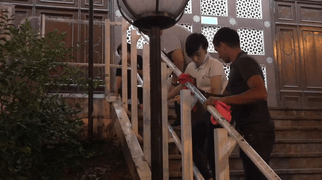 Police staff cleaning the mosque stairs not long after the incident
Police staff cleaning the mosque stairs not long after the incident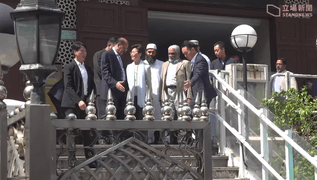 Carrie Lam (fourth from left) seen with mosque representatives leaving the premises the next day
Carrie Lam (fourth from left) seen with mosque representatives leaving the premises the next day
See also
References
- Islam and China's Hong Kong: Ethnic Identity, Muslim Networks and the New Silk Road
- http://www.islam.org.hk/eng/E-HKmosque.asp
- https://openaccess.leidenuniv.nl/bitstream/handle/1887/16773/ISIM_10_Contested_Mosques_in_Hong_Kong.pdf?sequence=1
- Paul O'Connor (1 September 2012). Islam in Hong Kong: Muslims and Everyday Life in China's World City. Hong Kong University Press. pp. 102–. ISBN 978-988-8139-57-6.
- Mahtani, Shibani; Asia, closeShibani MahtaniReporter covering Southeast; Ho, Hong KongEmailEmailBioBioFollowFollowRyan Kilpatrick; McLaughlin, Timothy. "Police blast mosque with water cannon as hundreds of thousands protest in Hong Kong". The Washington Post. Retrieved 21 October 2019.
- "港警兩度向清真寺發射藍色水炮 印度協會前主席中椒 民陣強烈譴責 警方稱誤中". hk.news.yahoo.com (in Chinese). Retrieved 21 October 2019.
- Cheng, Kris (21 October 2019). "Hong Kong leader apologises over police striking Kowloon mosque with water cannon blue dye". Hong Kong Free Press. Retrieved 22 February 2020.
- 【10.20九龍大遊行】10多輛警車隨著水炮車在彌敦道上清場,凡街上路人及九龍清真寺的建築都不放過,所到之處現場一片藍,散發濃濃刺激化學味 (in Chinese), retrieved 20 October 2019
- "警方水炮車藍色水射中清真寺 市民自發清洗" (in Chinese). now新聞. 20 October 2019. Retrieved 20 October 2019.
- "【警察襲擊清真寺】香港警察已水炮車襲擊尖沙咀清真寺,門外10多位信徒及市民,包括...", 譚文豪facebook專頁 (in Chinese), retrieved 20 October 2019
- "【10.20 九龍】警彌敦道狂射水炮驅散 清真寺被直射大閘染藍 少數族裔受傷". 立場新聞 Stand News (in Chinese). Retrieved 20 October 2019.
- "警方水炮直射清真寺染藍 巴裔青年感謝市民清潔:大家都是香港人!". 立場新聞. 20 October 2019. Retrieved 20 October 2019.
- "警帶水桶抵清真寺會面 清潔欄杆 5分鐘後「快閃」 全程避答記者提問 | 立場報道 | 立場新聞". 立場新聞 Stand News. Retrieved 21 October 2019.
- "水炮車向清真寺射藍色水多人跌倒 警方稱「誤中」(短片)". 明報 (in Chinese). 20 October 2019. Retrieved 20 October 2019.
- "融樂會譴責警方染污清真寺 總幹事被水劑射中需送院". hk.news.yahoo.com (in Chinese). Retrieved 21 October 2019.
- "香港人反抗》不被分化!民陣譴責港警攻擊清真寺 市民自發清潔 - 國際 - 自由時報電子報". 自由電子報 (in Chinese). 20 October 2019. Retrieved 21 October 2019.
- "印度協會前主席清真寺外中水炮送院 葉劉:張建宗應代警道歉 | 立場報道 | 立場新聞". 立場新聞 Stand News. Retrieved 21 October 2019.
- "港警水泡車轟清真寺 印度商會領袖斥無王法". ntdtv.com. Retrieved 21 October 2019.
| Wikimedia Commons has media related to Kowloon Masjid and Islamic Centre. |

